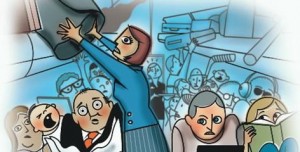 For flyers, finding adequate space in the overhead bin or under the seat in front, for that increasingly small carry-on item, is one of the most stressful stages of any flight. For airlines, it’s become the next competitive battleground, one that yields significant revenues, at little cost.
For flyers, finding adequate space in the overhead bin or under the seat in front, for that increasingly small carry-on item, is one of the most stressful stages of any flight. For airlines, it’s become the next competitive battleground, one that yields significant revenues, at little cost.
So, next time you fly with a dead catfish, kitchen sink or archery set, keep in mind that airlines may want you sitting comfortably, but they want your money much more.
From NYT:
A frosted cake. A 10-gallon hat. A car muffler.
People have crammed all sorts of things — including a kitchen sink — into airplane overhead compartments.
But now the battle of the bins, that preflight scrum over precious carry-on space, has turned into something else for airlines: the business of the bins.
After starting to charge fees for checking baggage, airlines are finding new ways to make money from carry-ons. Overhead compartments, it turns out, are valuable real estate — and these days, they go to the highest bidders.
Using an airline credit card? Come on down. Flying first class? Right this way. Paying an extra fee when you book? It’s your turn. Priority is increasingly given to those who pay.
“There are multiple ways you can improve upon your boarding zone,” said Andy Jacobs, the president of a candy company who travels about twice a month. “As a diamond member on Delta, I never have a problem securing space.”
Many travelers may not realize it, but a seat ticket does not automatically entitle them to overhead space. Once space runs out, passengers must check their luggage at the gate, without paying a fee — and then wait for it at the baggage claim at their destination. Airlines are capitalizing on the fact that many fliers are willing to pay for carry-on convenience.
When Mr. Jacobs is not flying Delta, he relies on credit cards to jump to the front of the boarding line. “Those cards are worth it,” he said. “I actually carry three different airline affinity credit cards.”
He has good reason to get to the front. “As a chocolate salesperson, I need to bring my bags on the plane so the chocolate won’t melt,” he said. “When you’re flying to a major customer and you pick up your bags at baggage claim and your samples are melted, that becomes a pretty big problem.”
As Mr. Jacobs has learned, there is only so much room.
And there is little chance that the free-for-all at check-in will ease soon. Airlines rely increasingly on fees, experts say. In 2012, domestic carriers collectively earned roughly $3.5 billion in checked-bag fees, up from less than half a billion dollars five years earlier, according to the Department of Transportation. Although exact figures are not yet available for early boarding revenue, analysts say it is increasing.
“There is growth there,” said Jay Sorenson, president of the airline consulting firm IdeaWorksCompany. “Airlines will implement more of these fees.”
Brian Easley, a career flight attendant, has watched the competition for overhead space become increasingly acrimonious.
“When someone gets to their row and looks up and sees something’s there, they kind of freak out about it,” he said. “They will throw a fit and they will start screaming at whoever put their stuff in their spot. We’ve had to throw people off the plane just because they refused to walk up a few feet and stick it in another overhead bin.”
People will carry on anything and everything, Mr. Easley said. On one flight to the Dominican Republic, a passenger brought a kitchen sink wrapped in a trash bag. “Luckily, at the time we were flying this particular Airbus that just has a ton of overhead bin space.”
Another time on the same route, a passenger carried on a car muffler. “I think in that case we did put it in a closet, next to a hula hoop someone had brought,” he said.
Robert W. Mann, an airline industry consultant, said that although new planes were designed to accommodate more carry-on bags, “there’s an infinite demand for overhead bin space,” especially as airlines squeeze more people than ever onto planes.
Airlines say they are providing an option travelers want.
“It’s something our customers desire,” said an American Airlines spokesman, Matt Miller. Charlie Hobart, a United Airlines spokesman, said, “We’re always looking for ways to make travel more convenient for our customers.” United let customers pay for priority boarding before its merger with Continental and reintroduced it this year. “Customers did enjoy it when we had it” before the merger, Mr. Hobart said.
Read the entire article here.
Image courtesy of USA Today.
